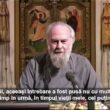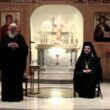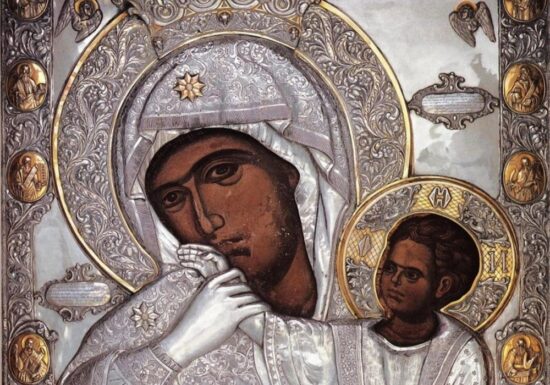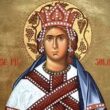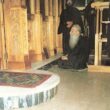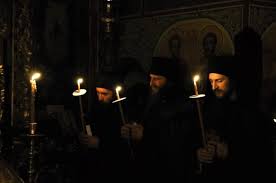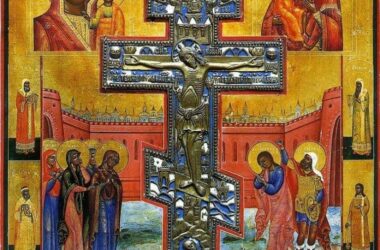At that time, as they went on their way, Jesus entered a village, and a woman named Martha welcomed him into her house. She had a sister named Mary, who sat at the Lord’s feet and listened to His teaching. But Martha was distracted with much serving. And she went up to him and said, “Lord, do you not care that my sister has left me to serve alone? Tell her then to help me.” But the Lord answered her, “Martha, Martha, you are anxious and troubled about many things, but one thing is necessary. Mary has chosen the good portion, which will not be taken away from her.”
As he said these things, a woman in the crowd raised her voice and said to him, “Blessed is the womb that bore you, and the breasts at which you nursed!” But he said, “Blessed rather are those who hear the word of God and keep it.”
Saint John Chrysostom, Homilies on Matthew, Homily V, III, in Fathers and Church Writers (1994), vol. 23, p. 70
“And he took her, but did not know her until she had given birth to her firstborn son” (Matthew 1:25). The word “until” here is not used by the evangelist to suggest that he knew her after she gave birth to her son, but to reveal that the Virgin was a virgin before giving birth. But why did he use the word “until”? Scripture often does this, using the word when referring to indefinite periods of time. For example, when it came to Noah’s ark during the time of the flood, it says, “The raven did not return until the earth was dry” (Genesis 8:7), even though it did not return afterward. Speaking of God, Scripture says, “From everlasting to everlasting, you are God” (Psalm 90:2), but these words do not limit the existence of God. In another passage, Scripture proclaims: “In his days, righteousness will flourish and abundance of peace until the moon is no more” (Psalm 72:7), which does not mean it puts an end to this beautiful celestial body. Likewise, in the Gospel text, Matthew used “until” to show us that the Virgin was a virgin before the birth of the Child; as for the time after birth, he left it to your understanding. Matthew only stated what was absolutely necessary for you to know, namely that the Virgin remained a virgin until childbirth, and he left the natural and obvious consequence of his words to your conscience. Because Joseph, being a righteous man, would not have wanted to know her at any price, even after the birth of her Son, knowing that she was a Mother who had been worthy of a new and foreign birth. If he had known her and had taken her as his wife, why would the Lord entrust her to the disciple as a defenseless woman who had no one, commanding him to take her with him? (John 19:26-27)”
Saint Ambrose of Milan, Letters, Letter XLII, 3, in Fathers and Church Writers (1994), vol. 53, p. 202
“Christ, in a special manner, chose the gift of virginity, He manifested righteousness, and He became what His mother was.”
Saint Ambrose of Milan, Letters, Letter LVI, 3-6, in Fathers and Church Writers (1994), vol. 53, pp. 236-237
“I cannot say that he (Bishop Bonosus) was unjustly accused regarding the sons of Mary, and that the concern of your holiness was without cause, namely that other children would have been born from the same Virgin’s womb from which Christ was incarnate. For the Lord Jesus would not have chosen to be born of a Virgin if He had considered her so uncontrolled that she would defile that dwelling of His bodily birth, that palace of eternal Kingdom, by receiving human seed. Whoever affirms this affirms nothing other than the disbelief of the Jews, who say that Jesus could not have been born of a virgin. And if such teaching is spread by priests, that Mary bore more children, it attacks even more forcefully the truth of faith. Indeed, as it is written, the Lord said to His Mother concerning the Apostle John: ‘Woman, behold your son’ (John 19:26), and likewise to John concerning Mary: ‘Behold your mother’ (John 19:27). But what does this mean other than that He also spoke about the innocence of His mother when the Lord, crucified on the Cross, was taking away the sin of the world? Or is there anything else being said other than that disbelief should shut its mouth and be silent, not daring to bring any insult to the Mother of the Lord? Therefore, the same impartial judge is a witness, the same demonstrator of her virgin honor, that she was only betrothed to Joseph and yet was not united with him by the bond of marriage (Matthew 1:18). For He would not have wanted to separate her from the companionship of Joseph if she were to have sons with him. But if this is not enough, the evangelist adds another testimony when he says: ‘And from that hour the disciple took her to his own home’ (John 19:27). But why did he make this separation? Why did he take her and separate her from her husband? Why does anyone who reads this Gospel waver, lose composure like one stumbling? Therefore, since there exists this testimony of the Son regarding the perfection of His Mother, this is a worthy inheritance of the entire honor of Mary; this is the manner of every perfection. He said this and gave up His spirit (John 19:30), enclosing the entire mystery within the boundaries of true devotion.
Saint Ambrose of Milan, Letters, a XXIX-a, 18-21, în PSB, vol. 53, p. 153
What is more beautiful than approaching Him (the Savior), to have communion with Him? What greater pleasure is there? Who will see Him and taste freely from the fountain of living water, what else can they desire? What dominion? What power? What riches, when they see how uncertain life is for rulers, how changing the states of empires are, how short life is, how great is the slavery in kingdoms where people live according to the will of others and not their own? But what rich person will pass to eternal life if they are not supported by the gain of virtues which all have, except the rich? (Matthew 19:26). Therefore, happiness does not consist in using wealth, but in seeing Him in order to despise them, and to reject those things contrary to truth, to consider them vain and futile, to love that beauty of pure truth, which shows how deceptive the colors of this age are. (…) Leave behind the appearance of the world, leave behind wickedness. Place within yourself the goodness of the mind, which has the grace of life’s power. Wash your garments and enter the heavenly city, which is the true grace of the saints, in which is the dwelling of God, around which are found the scribes of the Lord, where the days, or the sun, or the moon do not serve, but the Lord Himself is the light that illuminates the whole city (Revelation 21:23). (…) Let not your hands be weak and your knees without strength for worship and for your faith. Let not the weakness of your will turn back, let it not return to the path of wickedness. You have taken the good path, remain on it, you have arrived, hold on tight: Save your soul (Genesis 19:17). As you ascend, go straight ahead, for there is no safety in turning back. Upwards is the way, downwards is the fall, upwards is the ascent, downwards is the abyss. It is difficult to climb and dangerous to descend. But the Lord is strong, He who has strengthened you and guards you.”
Source: http://ziatullumina.ro


